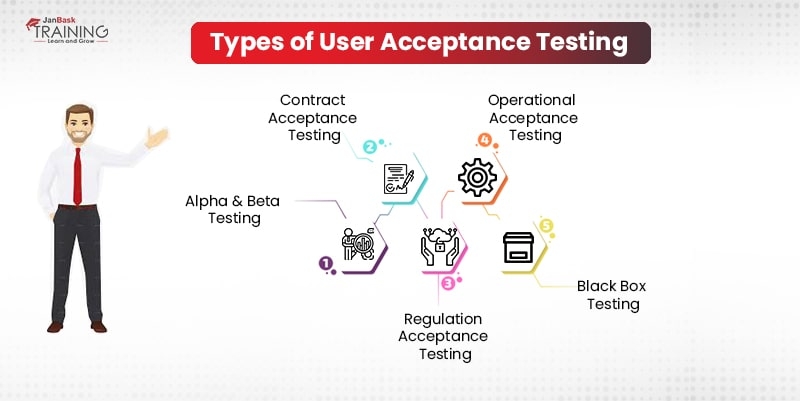22
SepGrab Deal : Upto 30% off on live classes + 2 free self-paced courses - SCHEDULE CALL
You must be wondering what is UAT? UAT means User Acceptance Testing. The definition of user acceptance testing is also clear. It involves the process of verifying a software solution that works perfectly for the user. It sounds easy but is quite tough in practice. It is done at the final phase of software testing before moving the application to the production environment. The purpose of UAT is to validate the end to end business flow.
To make the UAT process easier, here we will discuss the definition of user acceptance testing, user acceptance testing best practices, user acceptance testing approach, and most common types of user acceptance testing.
In the previous section, we have already discussed the user acceptance testing definition. So, you have a sound idea of what is UAT? The User Acceptance Test is the best way to understand if the previously signed contract between developer and customer is still on track. Running User Acceptance Tests ensure that there are no changes in the requirements, and everything is to satisfy the customers. Acceptance test cases are useful in multiple ways as discussed below:
In software engineering, User Acceptance Testing is utilized to identify or verify the customer’s needs. Here is the diagram below for your reference.

Learn QA Software Testing in the Easiest Way

You must be wondering how User Acceptance Testing is different from functional testing. Let us discuss both types of testing in brief below.
For example, Facebook launched a new feature to send postcards to family and friends. Technically, it works well but it lacks the interests of users. Here, the functional testing and usability testing works great but the User Acceptance Testing may probably fail as Facebook users don’t demand to send postcards within Facebook.
Read: Manual Testing Salary Guide: Secret to Boost Your Salary Is Here!
QA Software Testing Training

Here are the entry level points to be considered for the User Acceptance Testing before you start it practically.
QA Software Testing Training

To perform the User Acceptance Testing, here are the following steps that are needed to be followed by the testers:

Once you know the UAT basics and how is it different from the functional testing, you can quickly understand the different types of User Acceptance Testing below. There is a total of five common types of UAT testing. These are –
Read: What Is The Difference Between Smoke And Sanity Testing?

Alpha testing usually takes place in the development environment and it is done by the internal staff. Lone before the product is released for the external customers or user and potential users might conduct alpha tests. But keep in mind that alpha testing takes place in the development environment only. Get the feedback from alpha testers or development teams and fix issues to improve the overall usability of the product.
The next important concept is Beta Testing, which takes place in the customer environment and involves extensive testing done by a large group of customers. Based on the feedback given by the Beta users, it leads the improvements to a product. It is clear from the discussion that Alpha & Beta testing is performed before the product is released to customers.
Sending messages through emails is still the best way to conduct and run the Alpha/Beta tests or you can use automated solutions for the same. With automated solutions, users can quickly collect feedback and suggest comprehensive solutions for the software system.
This type of testing is majorly used for the developed software programs against certain criteria or specifications that are predefined within a contract. The project team can define the project specifications at the same time as soon as the team agrees on the contract itself.
The other name for regulation acceptance testing is compliance acceptance testing that complies either software meets regulations or not. It includes legal or governmental regulations.
The other name for the operational acceptance testing is production acceptance testing. The operational test cases make sure that workflows are in place to allow the software system to be used. It includes workflows for the backup plans, user training, security checks, and various maintenance processes too.
Black box testing is useful in both cases either functional or User Acceptance Testing. It is a method of software testing that analyzes certain functionalities without allowing testers to see the internal code structure. It is included under the UAT because black box testing shares the same principles as UAT. Black box testing is not the code-base but the requirements which the software should meet.
Read: 58 In-demand Software Testing Tools To Boost QA & Testing Efforts

QA Software Testing Training

In Software Engineering, UAT is one of the most interesting flavors of testing that has emerged over the last few years. With UAT, the client ensures “what to expect” from the product instead of assumptions. It makes sure that the product comes with no surprises when it is released in the market.
Now, when you know what is UAT, definition of user acceptance testing, user acceptance testing best practices, user acceptance testing approach, and its different types, enroll for the QA certification program at the JanBask Training to shape your career in the testing field and know more of different types of testing in the software engineering. A detailed study and practical approach not only make you a good learner but also prepares you to perform well in the job field.
 Pinterest
Pinterest
 Email
Email
The JanBask Training Team includes certified professionals and expert writers dedicated to helping learners navigate their career journeys in QA, Cybersecurity, Salesforce, and more. Each article is carefully researched and reviewed to ensure quality and relevance.

Cyber Security

QA

Salesforce

Business Analyst

MS SQL Server

Data Science

DevOps

Hadoop

Python

Artificial Intelligence

Machine Learning

Tableau
Search Posts
Related Posts
How Much Does A Performance Tester Earn In Different Countries?
![]() 1.5k
1.5k
Real-time and Job-Focused Manual Testing Exclusively from JanBask Training
![]() 662.1k
662.1k
Phases Of SDLC? Software Development Life Cycle Models You Need to Know
![]() 562.1k
562.1k
Software Testing Basics: Fundamentals, Principles, Lifecycle & Best Practices
![]() 128
128
LoadRunner Tutorial for Beginners – What all should you know?
![]() 8.2k
8.2k
Receive Latest Materials and Offers on QA Testing Course
Interviews